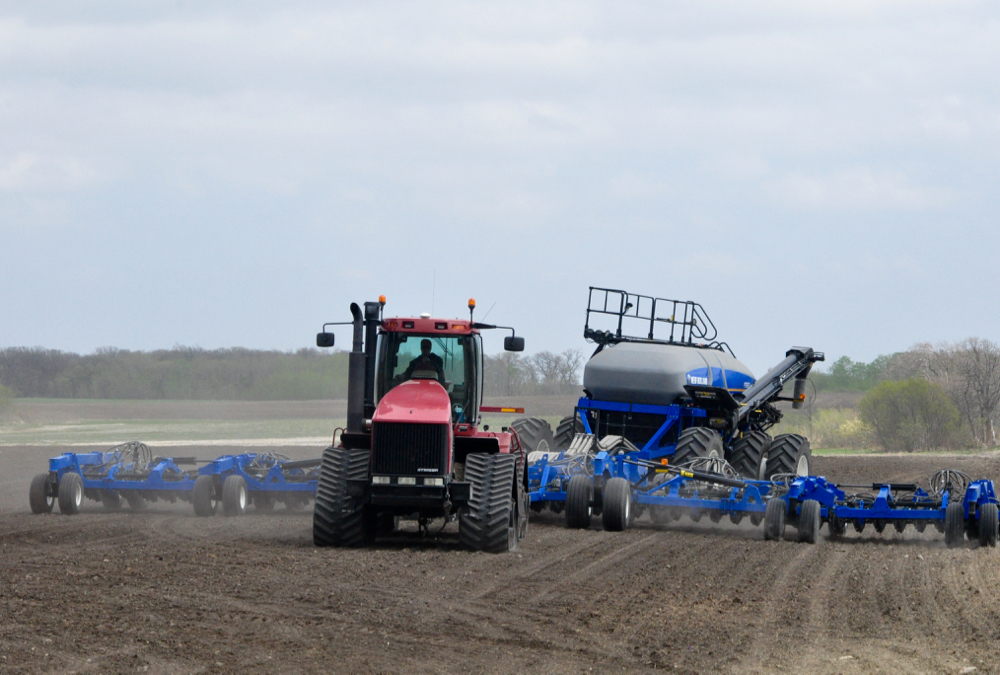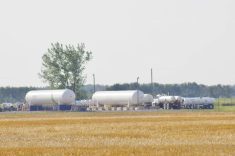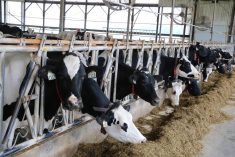Long before COVID-19 disrupted agricultural markets, Canadian farm leaders were lobbying the federal government for money to offset the effect of trade disputes and harvest problems.
But the latest farm income figures don’t necessarily back that call, showing, on the whole, Canadian farmers netted more money in 2019 than the year before.
2019 Canadian farm net cash income was $12.95 billion, up six per cent, or $750 million, from $12.2 billion in 2018, Statistics Canada reported last week.
And while net cash farm income fell 11 and five per cent in Manitoba and Saskatchewan, farmers in other provinces saw increases: Alberta (up 21 per cent), Ontario (4.5 per cent), Quebec (25.6 per cent) and British Columbia (27 per cent).
Read Also

Mazergroup’s Bob Mazer dies
Mazergroup’s Bob Mazer, who helped grow his family’s company into a string of farm equipment dealerships and the main dealer for New Holland machinery in Saskatchewan and Manitoba, died July 6 from cancer.
(Net cash income is farm revenue minus cash expenses.)
Why it matters: The federal government pledged $252 million in ad hoc funding to help farmers offset the impact of COVID-19. Farm groups say that’s not enough.
Total Canadian 2019 farm cash receipts were up six per cent to $66 billion.
Some of that increase came from a tripling of cannabis cash receipts to $1.7 billion compared to the year previous.
In addition, government subsidies (direct payments) to Canadian farmers jumped 41 per cent in 2019, up 41 per cent or $900 million to $3.2 billion.
Direct payments to Manitoba farmers were up 42 per cent, or $74.9 million, totalling $254.6 million.
Despite the generally positive farm income data, not all StatsCan’s figures were cause for optimism.

“It’s a mixed story for sure depending on the sector (of agriculture), depending on the province and so forth,” J.P. Gervais, Farm Credit Canada’s vice-president and chief agricultural economist told reporters during a telephone conference May 27.
Interest costs took a big jump.
Canadian and Manitoba farm debt increased by eight and seven per cent to $114.8 billion and $10.5 billion, respectively.
Support calls
Since COVID-19 farm groups have stepped up efforts to get additional aid.
The Canadian Federation of Agriculture (CFA) asked Ottawa for $2.6 billion, warning in an April 16 news release that “(W)ithout immediate assistance from the federal government, the Canadian agriculture sector cannot ensure our domestic food supply will remain secure for the immediate and long-term benefit of all Canadians.”
Much to the chagrin of farm groups Ottawa pledged just $252 million.
And before there’s more aid Agriculture Minister Marie-Claude Bibeau says farmers need to use money already provided through existing programs.
Bibeau either doesn’t understand her role, or hasn’t been able to convince her cabinet colleagues how much financial stress farmers are under, Keystone Agricultural Producers president Bill Campbell said in an interview May 25.
“If you can’t grasp the concept then maybe there’s someone who can,” he said.
But not all farmers agree more aid is needed, especially for Prairie grain farmers.

“Maybe sometime we will, but right now things aren’t that bad,” Kevin Hursh, a Saskatchewan consultant and columnist who farms near Cabri, said in an interview May 27.
Farmers have almost $2.3 billion in their AgriInvest accounts, an official from Bibeau’s office wrote in an email last week.
“Now is the time for producers to use their AgriInvest accounts,” the official wrote. “Account balances vary based on production structure, size and previous account use, but balances can be substantial. For example, a hog farmer has $46,000, on average, in their account while a potato farmer has roughly $93,000 on average.”
Agriculture and Agri-Food Canada has set up an online AgriStability calculator so farmers can estimate how much the program might pay out.
The deadline to sign up for AgriStability has been extended to July, and AgriStability payouts are expected to double to around $700 million, the official wrote.
Cattle and hog producers can apply for some of the $125 million being made available through AgriRecovery.
The Canadian Emergency Business Account (CEBA) has the potential to provide up to $670 million directly to farmers from the forgivable portion of Canadian Emergency Business Account interest-free loans, the official wrote. Recent program changes allow an estimated additional 36,566 farms to access CEBA, for a total of more than 67,000.
Little help
While Campbell credited the federal government for improving CEBA, Bibeau’s call to spend AgriInvest fund only works for those who still have money in the program.

“I know on our farm we have used it,” he said.
“Farmers have been bringing forward their legitimate concerns and she (Bibeau) has not been able to do that job and tell the government that this has to be addressed. So it is frustrating as a producer that when we speak with her that the whole ag concept is not being understood. Bread crumbs being thrown at the industry for somewhat of a survival, not an investment.”
Agriculture has the potential to help restore Canada’s economy as it rebuilds post-COVID, but the government has to invest, Campbell said.
The U.S. government has already budgeted $23.5 billion in ad hoc farm subsidies as part of its $2-trillion COVID aid program, and legislators are working on getting more.
Those subsidies help American farmers and make it harder for Canadian farmers to compete, Campbell said.
“Do you want to bring it all in from the States? Because they are investing in their ag industry,” he said. “Do you want agriculture and rural communities? If you’re not going to support us in times like this then just let us know and we’ll get by, but there ain’t going to be many of us.”
Some farmers probably need government aid, including cattle and hog producers that have seen prices fall as meat-packing plants slowed production or temporarily closed, Hursh said.
Ontario grain farmers, who grow mainly corn and soybeans, both of which have seen price declines — corn because of the drop in ethanol demand in the wake of lower oil prices and soybeans because of a trade dispute with China — might also need help, he said.
“Out here a lot of our costs are down — fertilizer and fuel,” Hursh said. “And many commodities (prices) are as strong or stronger than last year. I don’t see any COVID effect there.”
AgriStability works better than many farmers admit, he said.
Farm income has fallen the past couple of years, but after a number of good years, he said.
“Since 2008 we’ve had a pretty good run, but when you’re in a good run you think it will continue forever and when it drops off from there you think you’ve got a problem,” Hursh said. “It’s not that it’s an easy game. It’s highly capital intensive. The people in the game I think are looking at the potential for a really good year this year. Oftentimes there’s… an overriding issue and this year COVID is there, but grain prices (are steady to higher), grain is moving… I think we should thank our lucky stars in the grain industry and hope the good luck continues.”
Gervais is also optimistic.
“In prices I see a little bit of upside, but not too much,” he said. “If we could get some decent volume that’s where we could see a good year from a crops receipts standpoint.”
After recently sharing his views in the Western Producer, Hursh said for every two emails criticizing his stance, he received five agreeing with him, he said.



















